Entrepreneurship and Small Business: Types, Impact on UK Economy
VerifiedAdded on 2019/12/18
|14
|4126
|161
Report
AI Summary
This report provides a comprehensive analysis of entrepreneurship and small business management, focusing on the UK economy. It examines different types of entrepreneurship, including private, public, social, serial, and female entrepreneurship, and their relationship with various typologies. The report highlights the similarities and dissimilarities between entrepreneurial ventures and assesses the significant impact of micro and small businesses on the UK economy, particularly in job creation, domestic economy support, and improved living standards. Furthermore, it emphasizes the importance of small businesses and start-ups in driving social economy growth through innovation, employment, and adaptability. The report also delves into the characteristics, traits, and skills of successful entrepreneurs, exploring how personal backgrounds and experiences can either hinder or foster entrepreneurial endeavors.

Entrepreneurship and Small
Business Management
Business Management
Paraphrase This Document
Need a fresh take? Get an instant paraphrase of this document with our AI Paraphraser
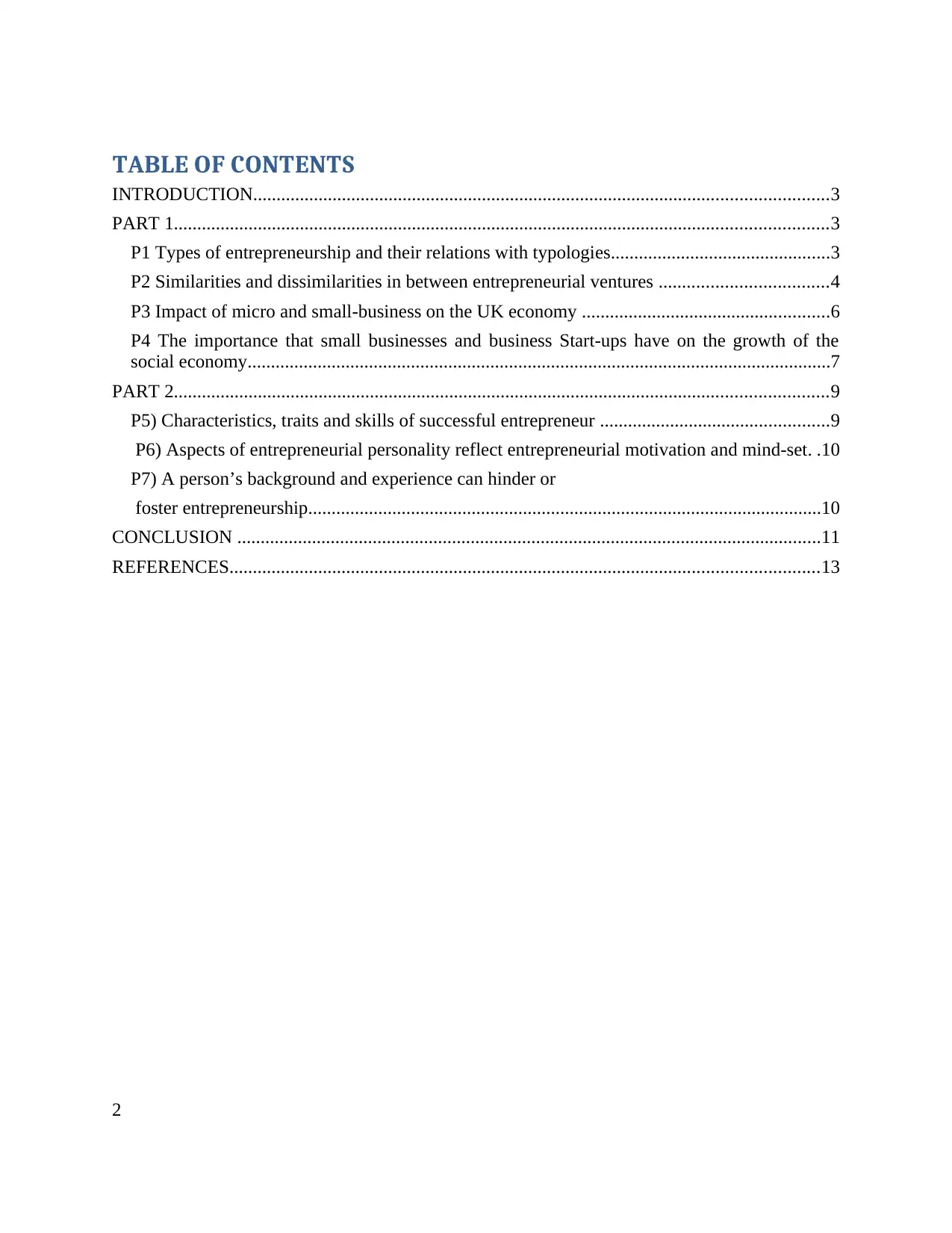
TABLE OF CONTENTS
INTRODUCTION...........................................................................................................................3
PART 1............................................................................................................................................3
P1 Types of entrepreneurship and their relations with typologies...............................................3
P2 Similarities and dissimilarities in between entrepreneurial ventures ....................................4
P3 Impact of micro and small-business on the UK economy .....................................................6
P4 The importance that small businesses and business Start-ups have on the growth of the
social economy.............................................................................................................................7
PART 2............................................................................................................................................9
P5) Characteristics, traits and skills of successful entrepreneur .................................................9
P6) Aspects of entrepreneurial personality reflect entrepreneurial motivation and mind-set. .10
P7) A person’s background and experience can hinder or
foster entrepreneurship..............................................................................................................10
CONCLUSION .............................................................................................................................11
REFERENCES..............................................................................................................................13
2
INTRODUCTION...........................................................................................................................3
PART 1............................................................................................................................................3
P1 Types of entrepreneurship and their relations with typologies...............................................3
P2 Similarities and dissimilarities in between entrepreneurial ventures ....................................4
P3 Impact of micro and small-business on the UK economy .....................................................6
P4 The importance that small businesses and business Start-ups have on the growth of the
social economy.............................................................................................................................7
PART 2............................................................................................................................................9
P5) Characteristics, traits and skills of successful entrepreneur .................................................9
P6) Aspects of entrepreneurial personality reflect entrepreneurial motivation and mind-set. .10
P7) A person’s background and experience can hinder or
foster entrepreneurship..............................................................................................................10
CONCLUSION .............................................................................................................................11
REFERENCES..............................................................................................................................13
2
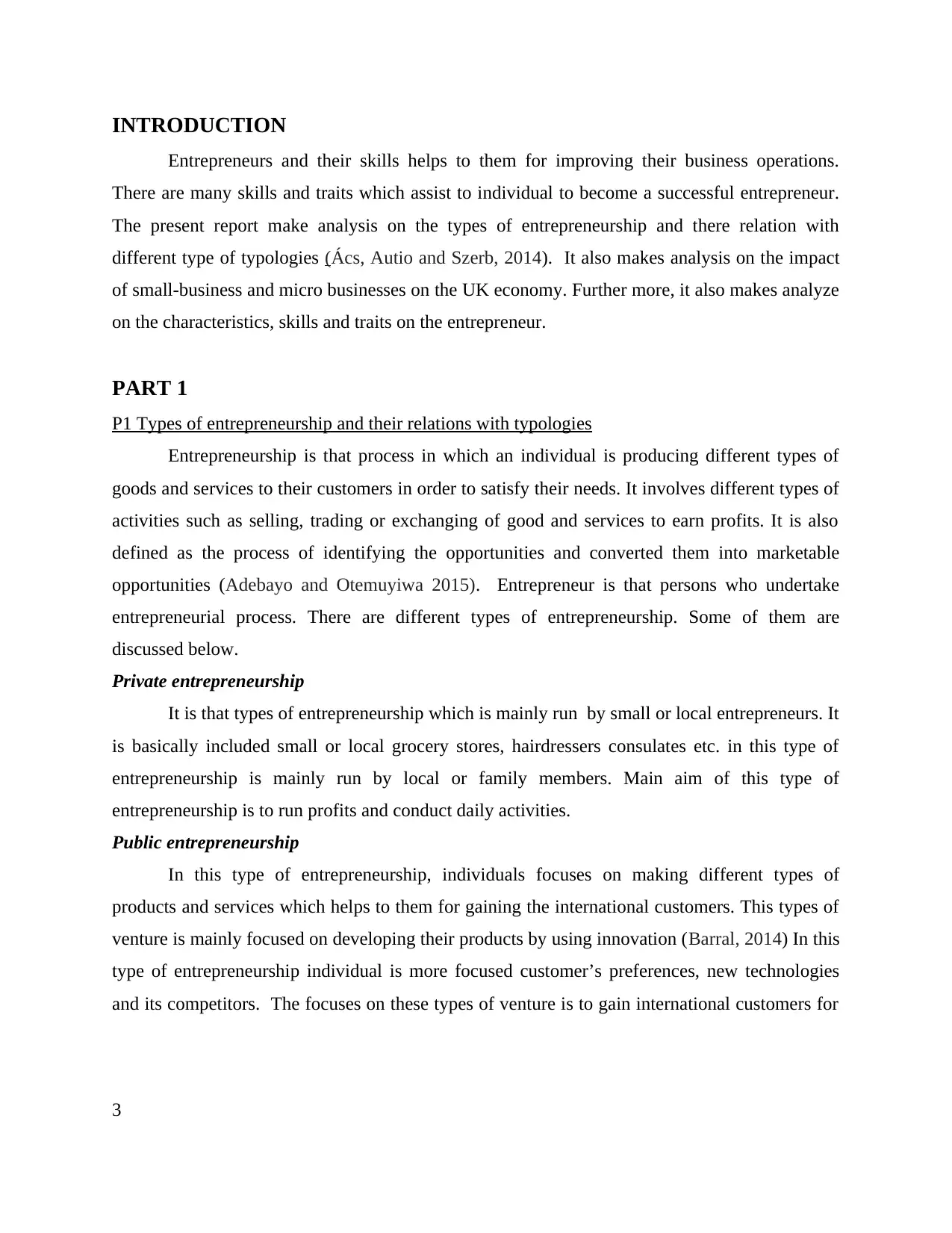
INTRODUCTION
Entrepreneurs and their skills helps to them for improving their business operations.
There are many skills and traits which assist to individual to become a successful entrepreneur.
The present report make analysis on the types of entrepreneurship and there relation with
different type of typologies (Ács, Autio and Szerb, 2014). It also makes analysis on the impact
of small-business and micro businesses on the UK economy. Further more, it also makes analyze
on the characteristics, skills and traits on the entrepreneur.
PART 1
P1 Types of entrepreneurship and their relations with typologies
Entrepreneurship is that process in which an individual is producing different types of
goods and services to their customers in order to satisfy their needs. It involves different types of
activities such as selling, trading or exchanging of good and services to earn profits. It is also
defined as the process of identifying the opportunities and converted them into marketable
opportunities (Adebayo and Otemuyiwa 2015). Entrepreneur is that persons who undertake
entrepreneurial process. There are different types of entrepreneurship. Some of them are
discussed below.
Private entrepreneurship
It is that types of entrepreneurship which is mainly run by small or local entrepreneurs. It
is basically included small or local grocery stores, hairdressers consulates etc. in this type of
entrepreneurship is mainly run by local or family members. Main aim of this type of
entrepreneurship is to run profits and conduct daily activities.
Public entrepreneurship
In this type of entrepreneurship, individuals focuses on making different types of
products and services which helps to them for gaining the international customers. This types of
venture is mainly focused on developing their products by using innovation (Barral, 2014) In this
type of entrepreneurship individual is more focused customer’s preferences, new technologies
and its competitors. The focuses on these types of venture is to gain international customers for
3
Entrepreneurs and their skills helps to them for improving their business operations.
There are many skills and traits which assist to individual to become a successful entrepreneur.
The present report make analysis on the types of entrepreneurship and there relation with
different type of typologies (Ács, Autio and Szerb, 2014). It also makes analysis on the impact
of small-business and micro businesses on the UK economy. Further more, it also makes analyze
on the characteristics, skills and traits on the entrepreneur.
PART 1
P1 Types of entrepreneurship and their relations with typologies
Entrepreneurship is that process in which an individual is producing different types of
goods and services to their customers in order to satisfy their needs. It involves different types of
activities such as selling, trading or exchanging of good and services to earn profits. It is also
defined as the process of identifying the opportunities and converted them into marketable
opportunities (Adebayo and Otemuyiwa 2015). Entrepreneur is that persons who undertake
entrepreneurial process. There are different types of entrepreneurship. Some of them are
discussed below.
Private entrepreneurship
It is that types of entrepreneurship which is mainly run by small or local entrepreneurs. It
is basically included small or local grocery stores, hairdressers consulates etc. in this type of
entrepreneurship is mainly run by local or family members. Main aim of this type of
entrepreneurship is to run profits and conduct daily activities.
Public entrepreneurship
In this type of entrepreneurship, individuals focuses on making different types of
products and services which helps to them for gaining the international customers. This types of
venture is mainly focused on developing their products by using innovation (Barral, 2014) In this
type of entrepreneurship individual is more focused customer’s preferences, new technologies
and its competitors. The focuses on these types of venture is to gain international customers for
3
⊘ This is a preview!⊘
Do you want full access?
Subscribe today to unlock all pages.

Trusted by 1+ million students worldwide
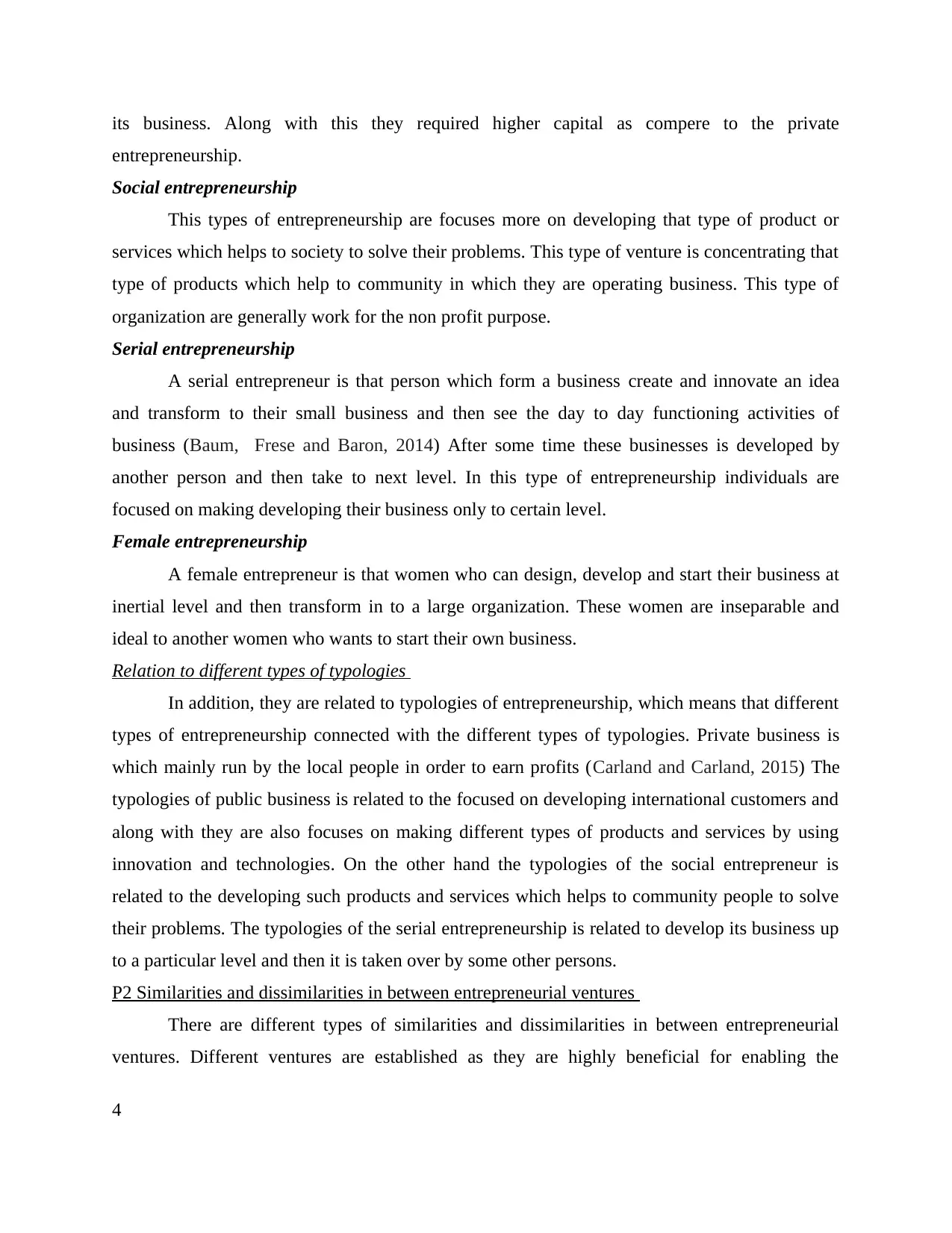
its business. Along with this they required higher capital as compere to the private
entrepreneurship.
Social entrepreneurship
This types of entrepreneurship are focuses more on developing that type of product or
services which helps to society to solve their problems. This type of venture is concentrating that
type of products which help to community in which they are operating business. This type of
organization are generally work for the non profit purpose.
Serial entrepreneurship
A serial entrepreneur is that person which form a business create and innovate an idea
and transform to their small business and then see the day to day functioning activities of
business (Baum, Frese and Baron, 2014) After some time these businesses is developed by
another person and then take to next level. In this type of entrepreneurship individuals are
focused on making developing their business only to certain level.
Female entrepreneurship
A female entrepreneur is that women who can design, develop and start their business at
inertial level and then transform in to a large organization. These women are inseparable and
ideal to another women who wants to start their own business.
Relation to different types of typologies
In addition, they are related to typologies of entrepreneurship, which means that different
types of entrepreneurship connected with the different types of typologies. Private business is
which mainly run by the local people in order to earn profits (Carland and Carland, 2015) The
typologies of public business is related to the focused on developing international customers and
along with they are also focuses on making different types of products and services by using
innovation and technologies. On the other hand the typologies of the social entrepreneur is
related to the developing such products and services which helps to community people to solve
their problems. The typologies of the serial entrepreneurship is related to develop its business up
to a particular level and then it is taken over by some other persons.
P2 Similarities and dissimilarities in between entrepreneurial ventures
There are different types of similarities and dissimilarities in between entrepreneurial
ventures. Different ventures are established as they are highly beneficial for enabling the
4
entrepreneurship.
Social entrepreneurship
This types of entrepreneurship are focuses more on developing that type of product or
services which helps to society to solve their problems. This type of venture is concentrating that
type of products which help to community in which they are operating business. This type of
organization are generally work for the non profit purpose.
Serial entrepreneurship
A serial entrepreneur is that person which form a business create and innovate an idea
and transform to their small business and then see the day to day functioning activities of
business (Baum, Frese and Baron, 2014) After some time these businesses is developed by
another person and then take to next level. In this type of entrepreneurship individuals are
focused on making developing their business only to certain level.
Female entrepreneurship
A female entrepreneur is that women who can design, develop and start their business at
inertial level and then transform in to a large organization. These women are inseparable and
ideal to another women who wants to start their own business.
Relation to different types of typologies
In addition, they are related to typologies of entrepreneurship, which means that different
types of entrepreneurship connected with the different types of typologies. Private business is
which mainly run by the local people in order to earn profits (Carland and Carland, 2015) The
typologies of public business is related to the focused on developing international customers and
along with they are also focuses on making different types of products and services by using
innovation and technologies. On the other hand the typologies of the social entrepreneur is
related to the developing such products and services which helps to community people to solve
their problems. The typologies of the serial entrepreneurship is related to develop its business up
to a particular level and then it is taken over by some other persons.
P2 Similarities and dissimilarities in between entrepreneurial ventures
There are different types of similarities and dissimilarities in between entrepreneurial
ventures. Different ventures are established as they are highly beneficial for enabling the
4
Paraphrase This Document
Need a fresh take? Get an instant paraphrase of this document with our AI Paraphraser
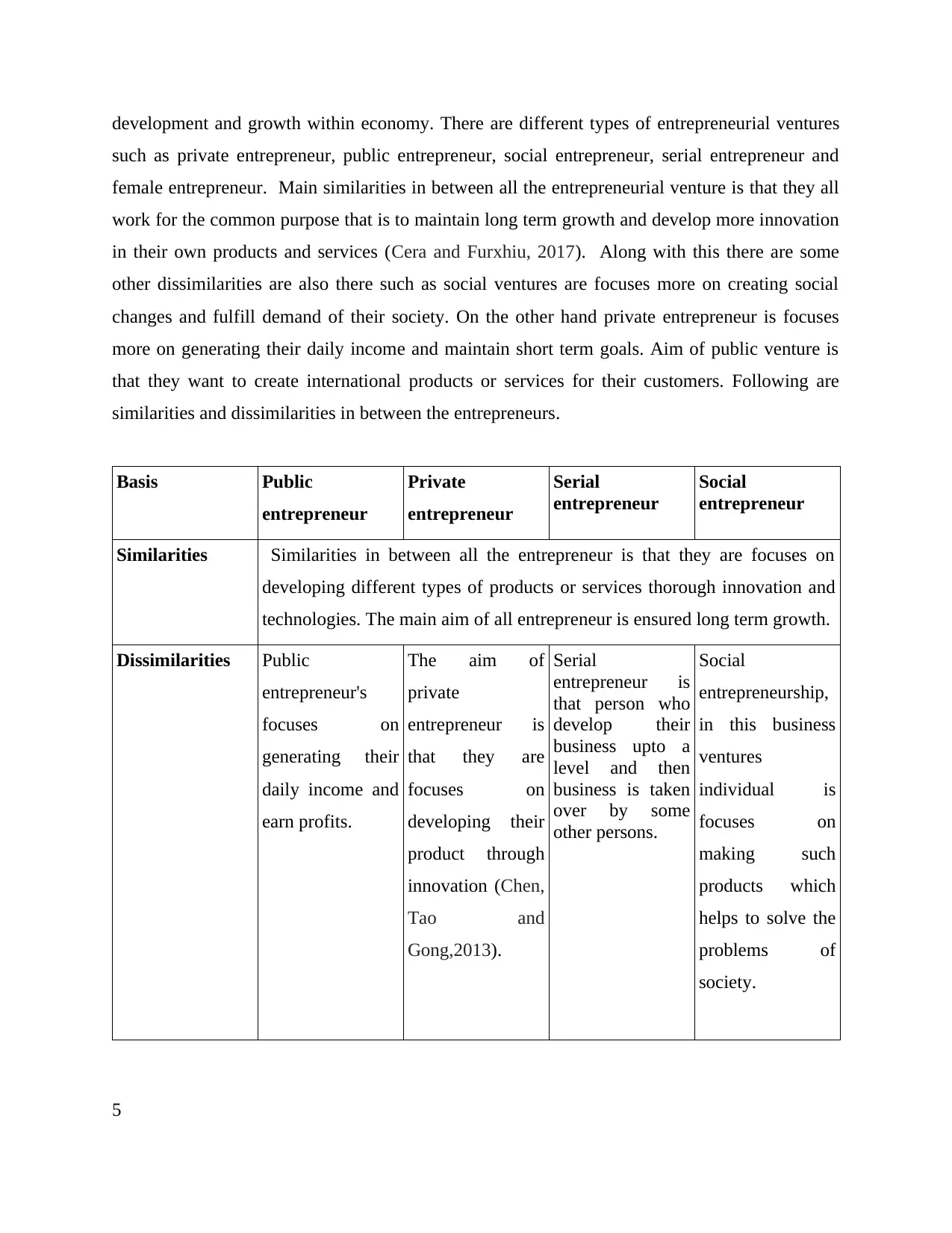
development and growth within economy. There are different types of entrepreneurial ventures
such as private entrepreneur, public entrepreneur, social entrepreneur, serial entrepreneur and
female entrepreneur. Main similarities in between all the entrepreneurial venture is that they all
work for the common purpose that is to maintain long term growth and develop more innovation
in their own products and services (Cera and Furxhiu, 2017). Along with this there are some
other dissimilarities are also there such as social ventures are focuses more on creating social
changes and fulfill demand of their society. On the other hand private entrepreneur is focuses
more on generating their daily income and maintain short term goals. Aim of public venture is
that they want to create international products or services for their customers. Following are
similarities and dissimilarities in between the entrepreneurs.
Basis Public
entrepreneur
Private
entrepreneur
Serial
entrepreneur
Social
entrepreneur
Similarities Similarities in between all the entrepreneur is that they are focuses on
developing different types of products or services thorough innovation and
technologies. The main aim of all entrepreneur is ensured long term growth.
Dissimilarities Public
entrepreneur's
focuses on
generating their
daily income and
earn profits.
The aim of
private
entrepreneur is
that they are
focuses on
developing their
product through
innovation (Chen,
Tao and
Gong,2013).
Serial
entrepreneur is
that person who
develop their
business upto a
level and then
business is taken
over by some
other persons.
Social
entrepreneurship,
in this business
ventures
individual is
focuses on
making such
products which
helps to solve the
problems of
society.
5
such as private entrepreneur, public entrepreneur, social entrepreneur, serial entrepreneur and
female entrepreneur. Main similarities in between all the entrepreneurial venture is that they all
work for the common purpose that is to maintain long term growth and develop more innovation
in their own products and services (Cera and Furxhiu, 2017). Along with this there are some
other dissimilarities are also there such as social ventures are focuses more on creating social
changes and fulfill demand of their society. On the other hand private entrepreneur is focuses
more on generating their daily income and maintain short term goals. Aim of public venture is
that they want to create international products or services for their customers. Following are
similarities and dissimilarities in between the entrepreneurs.
Basis Public
entrepreneur
Private
entrepreneur
Serial
entrepreneur
Social
entrepreneur
Similarities Similarities in between all the entrepreneur is that they are focuses on
developing different types of products or services thorough innovation and
technologies. The main aim of all entrepreneur is ensured long term growth.
Dissimilarities Public
entrepreneur's
focuses on
generating their
daily income and
earn profits.
The aim of
private
entrepreneur is
that they are
focuses on
developing their
product through
innovation (Chen,
Tao and
Gong,2013).
Serial
entrepreneur is
that person who
develop their
business upto a
level and then
business is taken
over by some
other persons.
Social
entrepreneurship,
in this business
ventures
individual is
focuses on
making such
products which
helps to solve the
problems of
society.
5
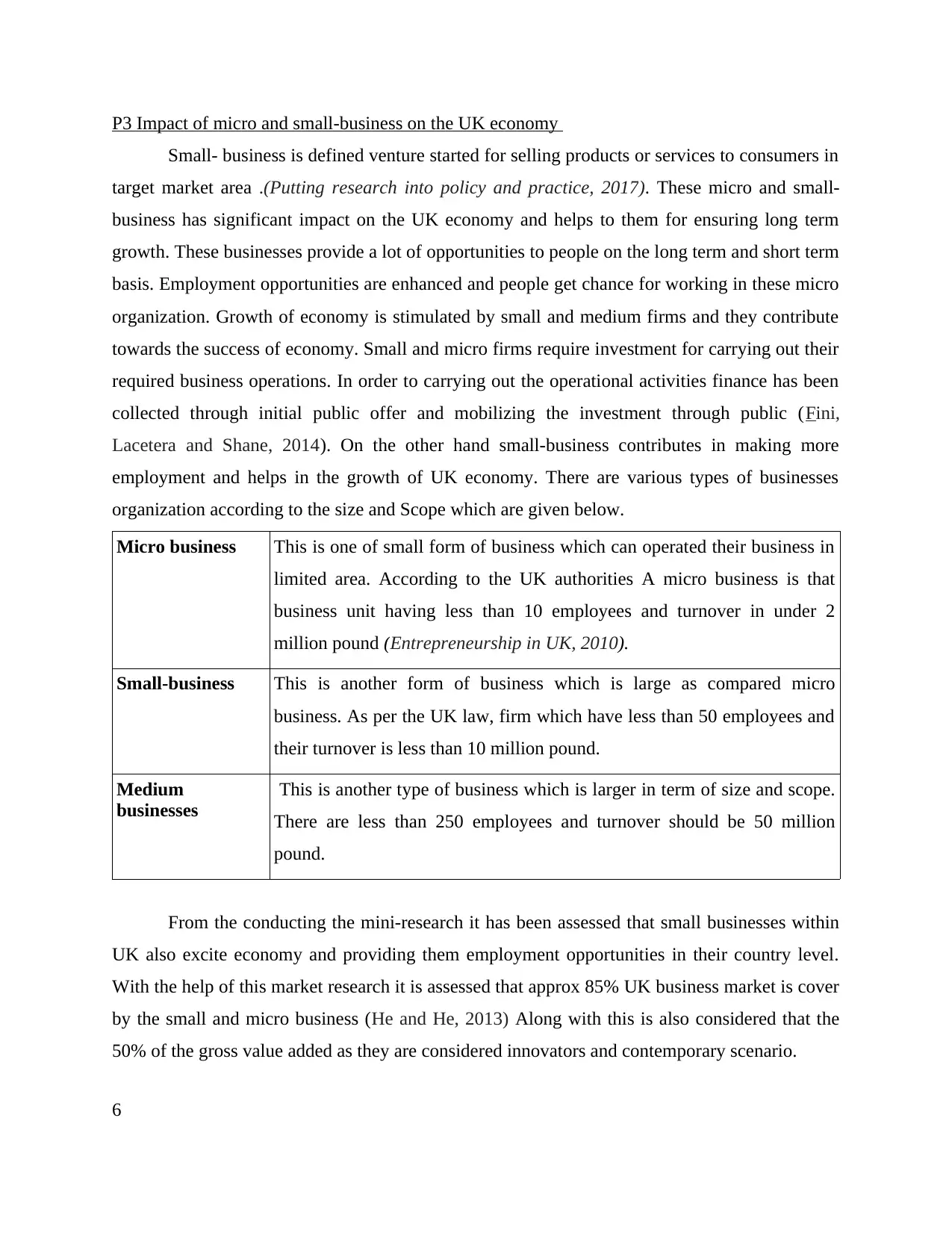
P3 Impact of micro and small-business on the UK economy
Small- business is defined venture started for selling products or services to consumers in
target market area .(Putting research into policy and practice, 2017). These micro and small-
business has significant impact on the UK economy and helps to them for ensuring long term
growth. These businesses provide a lot of opportunities to people on the long term and short term
basis. Employment opportunities are enhanced and people get chance for working in these micro
organization. Growth of economy is stimulated by small and medium firms and they contribute
towards the success of economy. Small and micro firms require investment for carrying out their
required business operations. In order to carrying out the operational activities finance has been
collected through initial public offer and mobilizing the investment through public (Fini,
Lacetera and Shane, 2014). On the other hand small-business contributes in making more
employment and helps in the growth of UK economy. There are various types of businesses
organization according to the size and Scope which are given below.
Micro business This is one of small form of business which can operated their business in
limited area. According to the UK authorities A micro business is that
business unit having less than 10 employees and turnover in under 2
million pound (Entrepreneurship in UK, 2010).
Small-business This is another form of business which is large as compared micro
business. As per the UK law, firm which have less than 50 employees and
their turnover is less than 10 million pound.
Medium
businesses
This is another type of business which is larger in term of size and scope.
There are less than 250 employees and turnover should be 50 million
pound.
From the conducting the mini-research it has been assessed that small businesses within
UK also excite economy and providing them employment opportunities in their country level.
With the help of this market research it is assessed that approx 85% UK business market is cover
by the small and micro business (He and He, 2013) Along with this is also considered that the
50% of the gross value added as they are considered innovators and contemporary scenario.
6
Small- business is defined venture started for selling products or services to consumers in
target market area .(Putting research into policy and practice, 2017). These micro and small-
business has significant impact on the UK economy and helps to them for ensuring long term
growth. These businesses provide a lot of opportunities to people on the long term and short term
basis. Employment opportunities are enhanced and people get chance for working in these micro
organization. Growth of economy is stimulated by small and medium firms and they contribute
towards the success of economy. Small and micro firms require investment for carrying out their
required business operations. In order to carrying out the operational activities finance has been
collected through initial public offer and mobilizing the investment through public (Fini,
Lacetera and Shane, 2014). On the other hand small-business contributes in making more
employment and helps in the growth of UK economy. There are various types of businesses
organization according to the size and Scope which are given below.
Micro business This is one of small form of business which can operated their business in
limited area. According to the UK authorities A micro business is that
business unit having less than 10 employees and turnover in under 2
million pound (Entrepreneurship in UK, 2010).
Small-business This is another form of business which is large as compared micro
business. As per the UK law, firm which have less than 50 employees and
their turnover is less than 10 million pound.
Medium
businesses
This is another type of business which is larger in term of size and scope.
There are less than 250 employees and turnover should be 50 million
pound.
From the conducting the mini-research it has been assessed that small businesses within
UK also excite economy and providing them employment opportunities in their country level.
With the help of this market research it is assessed that approx 85% UK business market is cover
by the small and micro business (He and He, 2013) Along with this is also considered that the
50% of the gross value added as they are considered innovators and contemporary scenario.
6
⊘ This is a preview!⊘
Do you want full access?
Subscribe today to unlock all pages.

Trusted by 1+ million students worldwide
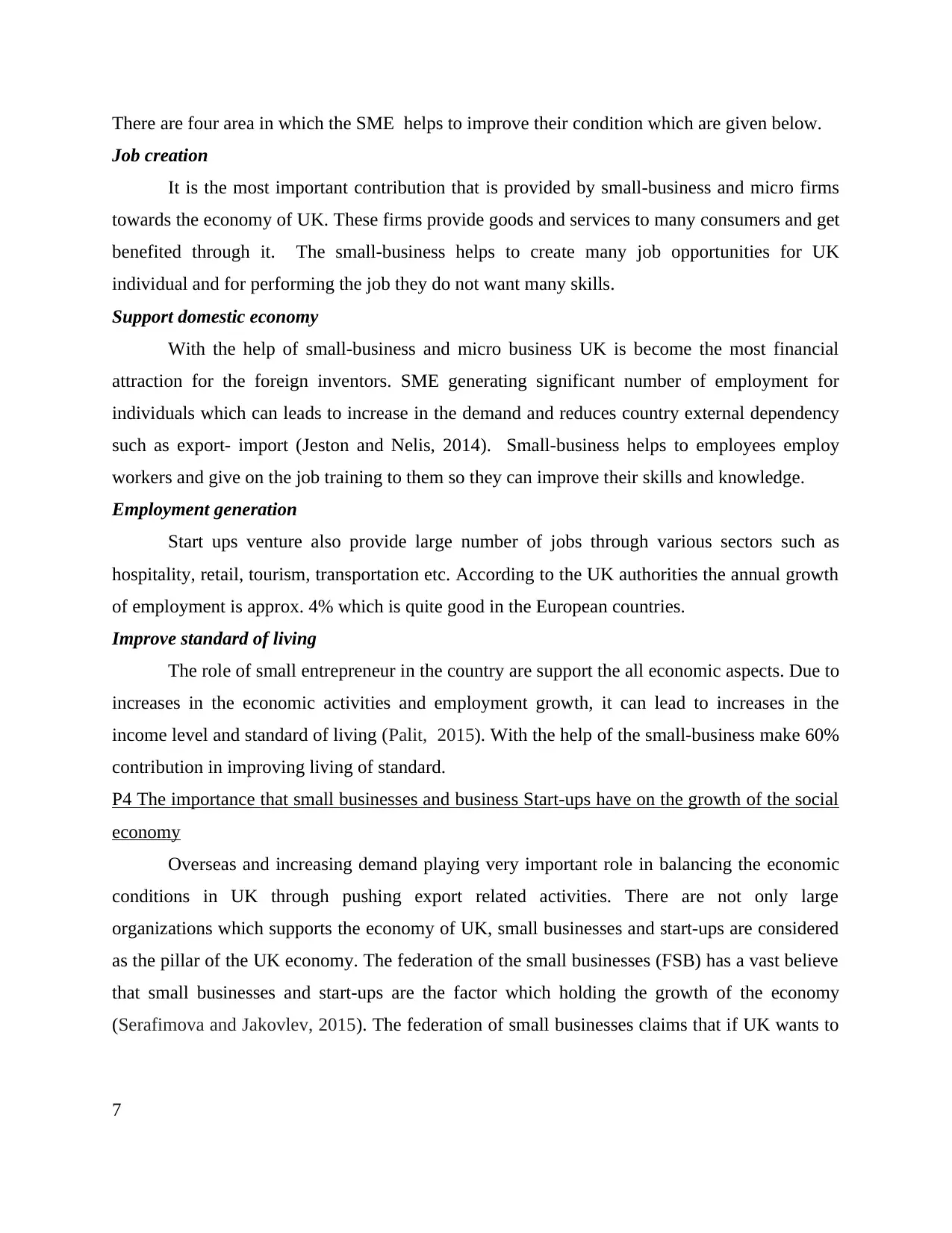
There are four area in which the SME helps to improve their condition which are given below.
Job creation
It is the most important contribution that is provided by small-business and micro firms
towards the economy of UK. These firms provide goods and services to many consumers and get
benefited through it. The small-business helps to create many job opportunities for UK
individual and for performing the job they do not want many skills.
Support domestic economy
With the help of small-business and micro business UK is become the most financial
attraction for the foreign inventors. SME generating significant number of employment for
individuals which can leads to increase in the demand and reduces country external dependency
such as export- import (Jeston and Nelis, 2014). Small-business helps to employees employ
workers and give on the job training to them so they can improve their skills and knowledge.
Employment generation
Start ups venture also provide large number of jobs through various sectors such as
hospitality, retail, tourism, transportation etc. According to the UK authorities the annual growth
of employment is approx. 4% which is quite good in the European countries.
Improve standard of living
The role of small entrepreneur in the country are support the all economic aspects. Due to
increases in the economic activities and employment growth, it can lead to increases in the
income level and standard of living (Palit, 2015). With the help of the small-business make 60%
contribution in improving living of standard.
P4 The importance that small businesses and business Start-ups have on the growth of the social
economy
Overseas and increasing demand playing very important role in balancing the economic
conditions in UK through pushing export related activities. There are not only large
organizations which supports the economy of UK, small businesses and start-ups are considered
as the pillar of the UK economy. The federation of the small businesses (FSB) has a vast believe
that small businesses and start-ups are the factor which holding the growth of the economy
(Serafimova and Jakovlev, 2015). The federation of small businesses claims that if UK wants to
7
Job creation
It is the most important contribution that is provided by small-business and micro firms
towards the economy of UK. These firms provide goods and services to many consumers and get
benefited through it. The small-business helps to create many job opportunities for UK
individual and for performing the job they do not want many skills.
Support domestic economy
With the help of small-business and micro business UK is become the most financial
attraction for the foreign inventors. SME generating significant number of employment for
individuals which can leads to increase in the demand and reduces country external dependency
such as export- import (Jeston and Nelis, 2014). Small-business helps to employees employ
workers and give on the job training to them so they can improve their skills and knowledge.
Employment generation
Start ups venture also provide large number of jobs through various sectors such as
hospitality, retail, tourism, transportation etc. According to the UK authorities the annual growth
of employment is approx. 4% which is quite good in the European countries.
Improve standard of living
The role of small entrepreneur in the country are support the all economic aspects. Due to
increases in the economic activities and employment growth, it can lead to increases in the
income level and standard of living (Palit, 2015). With the help of the small-business make 60%
contribution in improving living of standard.
P4 The importance that small businesses and business Start-ups have on the growth of the social
economy
Overseas and increasing demand playing very important role in balancing the economic
conditions in UK through pushing export related activities. There are not only large
organizations which supports the economy of UK, small businesses and start-ups are considered
as the pillar of the UK economy. The federation of the small businesses (FSB) has a vast believe
that small businesses and start-ups are the factor which holding the growth of the economy
(Serafimova and Jakovlev, 2015). The federation of small businesses claims that if UK wants to
7
Paraphrase This Document
Need a fresh take? Get an instant paraphrase of this document with our AI Paraphraser
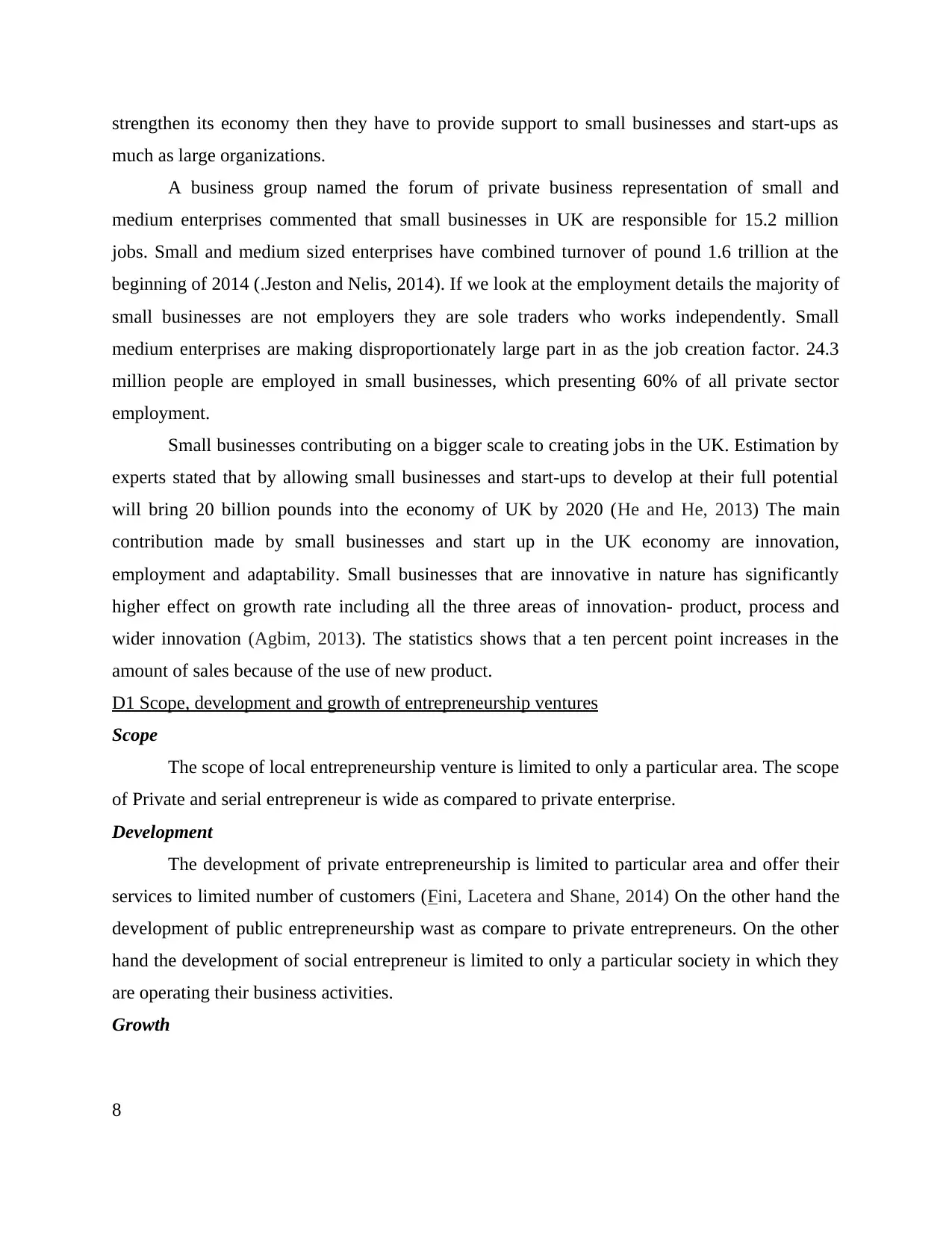
strengthen its economy then they have to provide support to small businesses and start-ups as
much as large organizations.
A business group named the forum of private business representation of small and
medium enterprises commented that small businesses in UK are responsible for 15.2 million
jobs. Small and medium sized enterprises have combined turnover of pound 1.6 trillion at the
beginning of 2014 (.Jeston and Nelis, 2014). If we look at the employment details the majority of
small businesses are not employers they are sole traders who works independently. Small
medium enterprises are making disproportionately large part in as the job creation factor. 24.3
million people are employed in small businesses, which presenting 60% of all private sector
employment.
Small businesses contributing on a bigger scale to creating jobs in the UK. Estimation by
experts stated that by allowing small businesses and start-ups to develop at their full potential
will bring 20 billion pounds into the economy of UK by 2020 (He and He, 2013) The main
contribution made by small businesses and start up in the UK economy are innovation,
employment and adaptability. Small businesses that are innovative in nature has significantly
higher effect on growth rate including all the three areas of innovation- product, process and
wider innovation (Agbim, 2013). The statistics shows that a ten percent point increases in the
amount of sales because of the use of new product.
D1 Scope, development and growth of entrepreneurship ventures
Scope
The scope of local entrepreneurship venture is limited to only a particular area. The scope
of Private and serial entrepreneur is wide as compared to private enterprise.
Development
The development of private entrepreneurship is limited to particular area and offer their
services to limited number of customers (Fini, Lacetera and Shane, 2014) On the other hand the
development of public entrepreneurship wast as compare to private entrepreneurs. On the other
hand the development of social entrepreneur is limited to only a particular society in which they
are operating their business activities.
Growth
8
much as large organizations.
A business group named the forum of private business representation of small and
medium enterprises commented that small businesses in UK are responsible for 15.2 million
jobs. Small and medium sized enterprises have combined turnover of pound 1.6 trillion at the
beginning of 2014 (.Jeston and Nelis, 2014). If we look at the employment details the majority of
small businesses are not employers they are sole traders who works independently. Small
medium enterprises are making disproportionately large part in as the job creation factor. 24.3
million people are employed in small businesses, which presenting 60% of all private sector
employment.
Small businesses contributing on a bigger scale to creating jobs in the UK. Estimation by
experts stated that by allowing small businesses and start-ups to develop at their full potential
will bring 20 billion pounds into the economy of UK by 2020 (He and He, 2013) The main
contribution made by small businesses and start up in the UK economy are innovation,
employment and adaptability. Small businesses that are innovative in nature has significantly
higher effect on growth rate including all the three areas of innovation- product, process and
wider innovation (Agbim, 2013). The statistics shows that a ten percent point increases in the
amount of sales because of the use of new product.
D1 Scope, development and growth of entrepreneurship ventures
Scope
The scope of local entrepreneurship venture is limited to only a particular area. The scope
of Private and serial entrepreneur is wide as compared to private enterprise.
Development
The development of private entrepreneurship is limited to particular area and offer their
services to limited number of customers (Fini, Lacetera and Shane, 2014) On the other hand the
development of public entrepreneurship wast as compare to private entrepreneurs. On the other
hand the development of social entrepreneur is limited to only a particular society in which they
are operating their business activities.
Growth
8
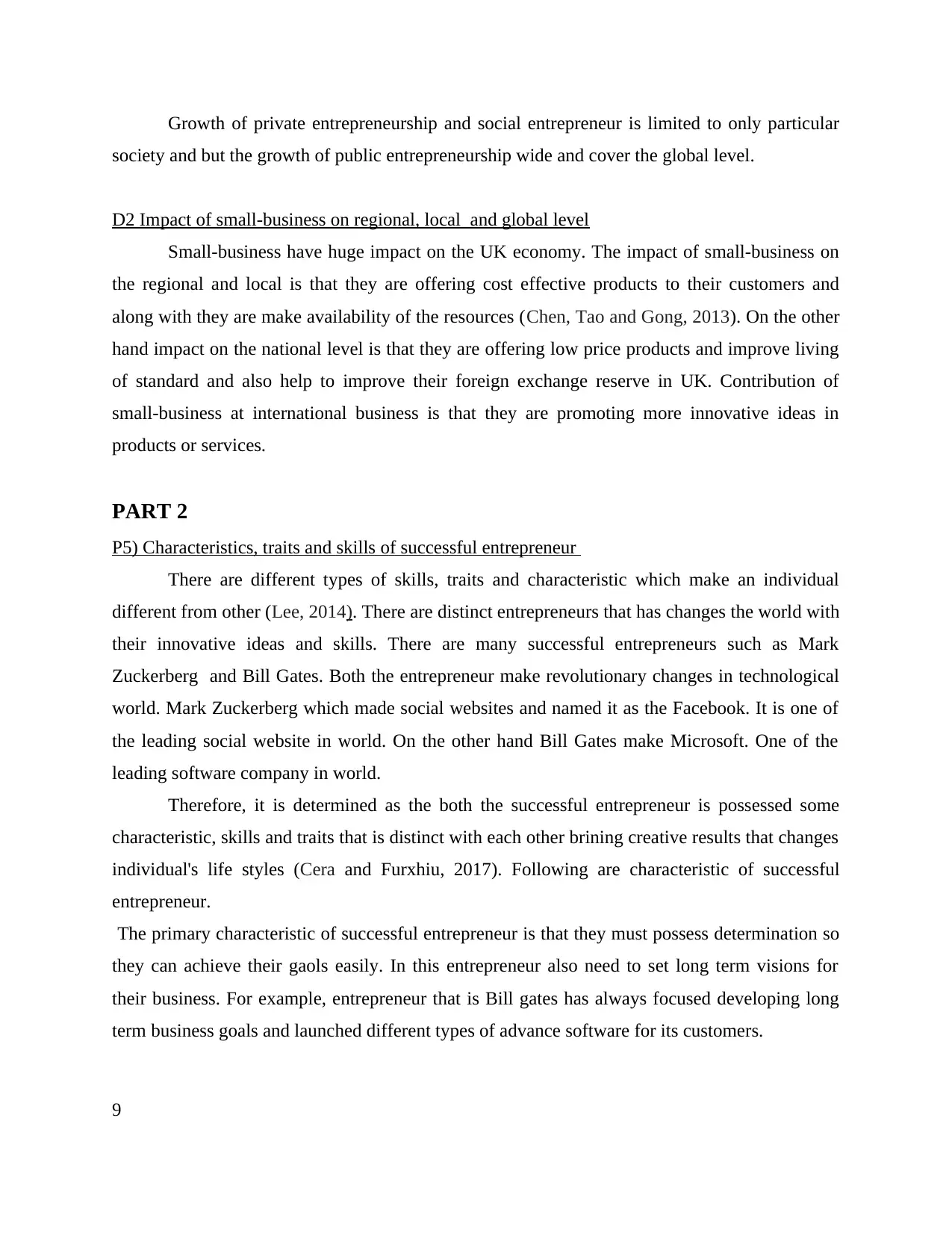
Growth of private entrepreneurship and social entrepreneur is limited to only particular
society and but the growth of public entrepreneurship wide and cover the global level.
D2 Impact of small-business on regional, local and global level
Small-business have huge impact on the UK economy. The impact of small-business on
the regional and local is that they are offering cost effective products to their customers and
along with they are make availability of the resources (Chen, Tao and Gong, 2013). On the other
hand impact on the national level is that they are offering low price products and improve living
of standard and also help to improve their foreign exchange reserve in UK. Contribution of
small-business at international business is that they are promoting more innovative ideas in
products or services.
PART 2
P5) Characteristics, traits and skills of successful entrepreneur
There are different types of skills, traits and characteristic which make an individual
different from other (Lee, 2014). There are distinct entrepreneurs that has changes the world with
their innovative ideas and skills. There are many successful entrepreneurs such as Mark
Zuckerberg and Bill Gates. Both the entrepreneur make revolutionary changes in technological
world. Mark Zuckerberg which made social websites and named it as the Facebook. It is one of
the leading social website in world. On the other hand Bill Gates make Microsoft. One of the
leading software company in world.
Therefore, it is determined as the both the successful entrepreneur is possessed some
characteristic, skills and traits that is distinct with each other brining creative results that changes
individual's life styles (Cera and Furxhiu, 2017). Following are characteristic of successful
entrepreneur.
The primary characteristic of successful entrepreneur is that they must possess determination so
they can achieve their gaols easily. In this entrepreneur also need to set long term visions for
their business. For example, entrepreneur that is Bill gates has always focused developing long
term business goals and launched different types of advance software for its customers.
9
society and but the growth of public entrepreneurship wide and cover the global level.
D2 Impact of small-business on regional, local and global level
Small-business have huge impact on the UK economy. The impact of small-business on
the regional and local is that they are offering cost effective products to their customers and
along with they are make availability of the resources (Chen, Tao and Gong, 2013). On the other
hand impact on the national level is that they are offering low price products and improve living
of standard and also help to improve their foreign exchange reserve in UK. Contribution of
small-business at international business is that they are promoting more innovative ideas in
products or services.
PART 2
P5) Characteristics, traits and skills of successful entrepreneur
There are different types of skills, traits and characteristic which make an individual
different from other (Lee, 2014). There are distinct entrepreneurs that has changes the world with
their innovative ideas and skills. There are many successful entrepreneurs such as Mark
Zuckerberg and Bill Gates. Both the entrepreneur make revolutionary changes in technological
world. Mark Zuckerberg which made social websites and named it as the Facebook. It is one of
the leading social website in world. On the other hand Bill Gates make Microsoft. One of the
leading software company in world.
Therefore, it is determined as the both the successful entrepreneur is possessed some
characteristic, skills and traits that is distinct with each other brining creative results that changes
individual's life styles (Cera and Furxhiu, 2017). Following are characteristic of successful
entrepreneur.
The primary characteristic of successful entrepreneur is that they must possess determination so
they can achieve their gaols easily. In this entrepreneur also need to set long term visions for
their business. For example, entrepreneur that is Bill gates has always focused developing long
term business goals and launched different types of advance software for its customers.
9
⊘ This is a preview!⊘
Do you want full access?
Subscribe today to unlock all pages.

Trusted by 1+ million students worldwide
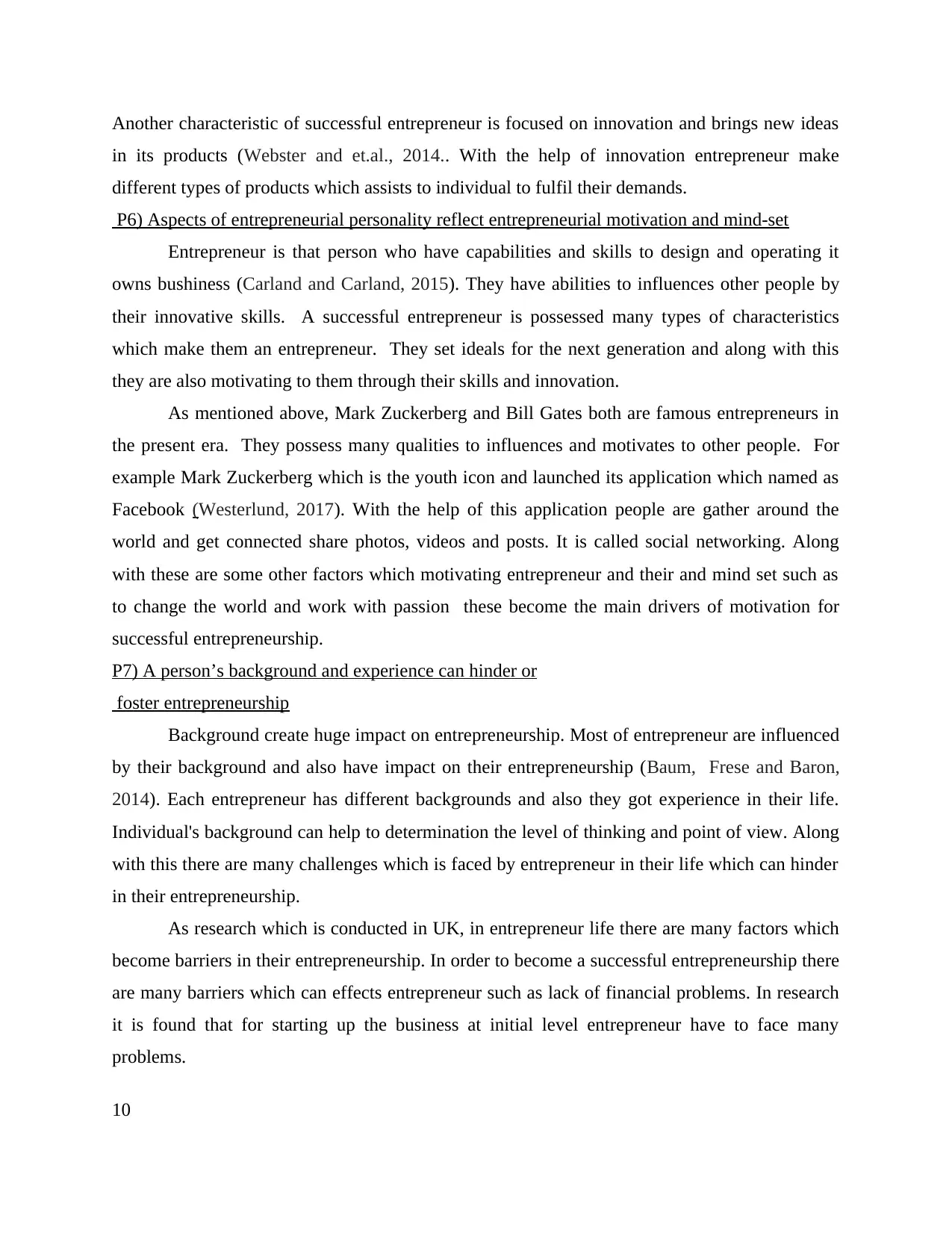
Another characteristic of successful entrepreneur is focused on innovation and brings new ideas
in its products (Webster and et.al., 2014.. With the help of innovation entrepreneur make
different types of products which assists to individual to fulfil their demands.
P6) Aspects of entrepreneurial personality reflect entrepreneurial motivation and mind-set
Entrepreneur is that person who have capabilities and skills to design and operating it
owns bushiness (Carland and Carland, 2015). They have abilities to influences other people by
their innovative skills. A successful entrepreneur is possessed many types of characteristics
which make them an entrepreneur. They set ideals for the next generation and along with this
they are also motivating to them through their skills and innovation.
As mentioned above, Mark Zuckerberg and Bill Gates both are famous entrepreneurs in
the present era. They possess many qualities to influences and motivates to other people. For
example Mark Zuckerberg which is the youth icon and launched its application which named as
Facebook (Westerlund, 2017). With the help of this application people are gather around the
world and get connected share photos, videos and posts. It is called social networking. Along
with these are some other factors which motivating entrepreneur and their and mind set such as
to change the world and work with passion these become the main drivers of motivation for
successful entrepreneurship.
P7) A person’s background and experience can hinder or
foster entrepreneurship
Background create huge impact on entrepreneurship. Most of entrepreneur are influenced
by their background and also have impact on their entrepreneurship (Baum, Frese and Baron,
2014). Each entrepreneur has different backgrounds and also they got experience in their life.
Individual's background can help to determination the level of thinking and point of view. Along
with this there are many challenges which is faced by entrepreneur in their life which can hinder
in their entrepreneurship.
As research which is conducted in UK, in entrepreneur life there are many factors which
become barriers in their entrepreneurship. In order to become a successful entrepreneurship there
are many barriers which can effects entrepreneur such as lack of financial problems. In research
it is found that for starting up the business at initial level entrepreneur have to face many
problems.
10
in its products (Webster and et.al., 2014.. With the help of innovation entrepreneur make
different types of products which assists to individual to fulfil their demands.
P6) Aspects of entrepreneurial personality reflect entrepreneurial motivation and mind-set
Entrepreneur is that person who have capabilities and skills to design and operating it
owns bushiness (Carland and Carland, 2015). They have abilities to influences other people by
their innovative skills. A successful entrepreneur is possessed many types of characteristics
which make them an entrepreneur. They set ideals for the next generation and along with this
they are also motivating to them through their skills and innovation.
As mentioned above, Mark Zuckerberg and Bill Gates both are famous entrepreneurs in
the present era. They possess many qualities to influences and motivates to other people. For
example Mark Zuckerberg which is the youth icon and launched its application which named as
Facebook (Westerlund, 2017). With the help of this application people are gather around the
world and get connected share photos, videos and posts. It is called social networking. Along
with these are some other factors which motivating entrepreneur and their and mind set such as
to change the world and work with passion these become the main drivers of motivation for
successful entrepreneurship.
P7) A person’s background and experience can hinder or
foster entrepreneurship
Background create huge impact on entrepreneurship. Most of entrepreneur are influenced
by their background and also have impact on their entrepreneurship (Baum, Frese and Baron,
2014). Each entrepreneur has different backgrounds and also they got experience in their life.
Individual's background can help to determination the level of thinking and point of view. Along
with this there are many challenges which is faced by entrepreneur in their life which can hinder
in their entrepreneurship.
As research which is conducted in UK, in entrepreneur life there are many factors which
become barriers in their entrepreneurship. In order to become a successful entrepreneurship there
are many barriers which can effects entrepreneur such as lack of financial problems. In research
it is found that for starting up the business at initial level entrepreneur have to face many
problems.
10
Paraphrase This Document
Need a fresh take? Get an instant paraphrase of this document with our AI Paraphraser
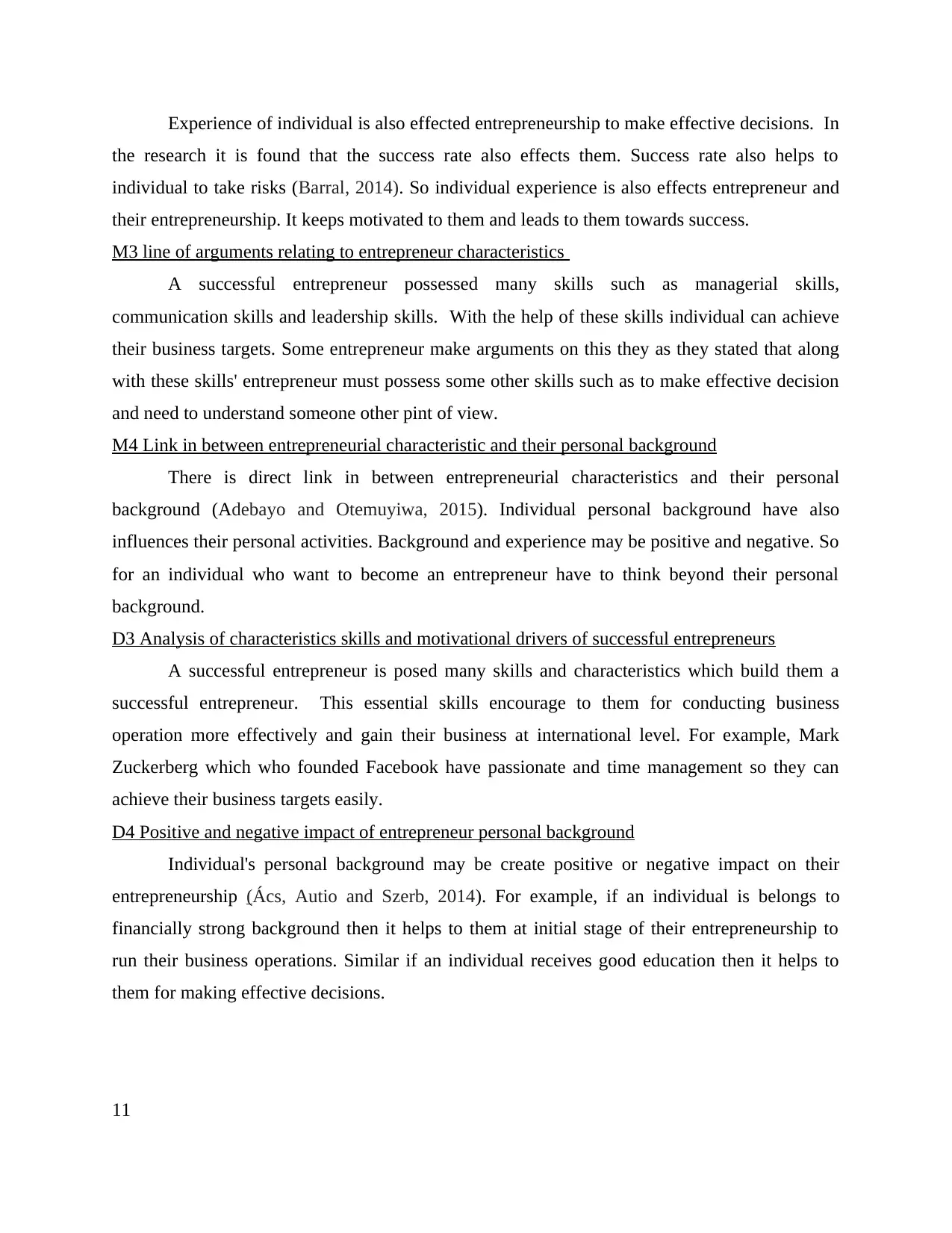
Experience of individual is also effected entrepreneurship to make effective decisions. In
the research it is found that the success rate also effects them. Success rate also helps to
individual to take risks (Barral, 2014). So individual experience is also effects entrepreneur and
their entrepreneurship. It keeps motivated to them and leads to them towards success.
M3 line of arguments relating to entrepreneur characteristics
A successful entrepreneur possessed many skills such as managerial skills,
communication skills and leadership skills. With the help of these skills individual can achieve
their business targets. Some entrepreneur make arguments on this they as they stated that along
with these skills' entrepreneur must possess some other skills such as to make effective decision
and need to understand someone other pint of view.
M4 Link in between entrepreneurial characteristic and their personal background
There is direct link in between entrepreneurial characteristics and their personal
background (Adebayo and Otemuyiwa, 2015). Individual personal background have also
influences their personal activities. Background and experience may be positive and negative. So
for an individual who want to become an entrepreneur have to think beyond their personal
background.
D3 Analysis of characteristics skills and motivational drivers of successful entrepreneurs
A successful entrepreneur is posed many skills and characteristics which build them a
successful entrepreneur. This essential skills encourage to them for conducting business
operation more effectively and gain their business at international level. For example, Mark
Zuckerberg which who founded Facebook have passionate and time management so they can
achieve their business targets easily.
D4 Positive and negative impact of entrepreneur personal background
Individual's personal background may be create positive or negative impact on their
entrepreneurship (Ács, Autio and Szerb, 2014). For example, if an individual is belongs to
financially strong background then it helps to them at initial stage of their entrepreneurship to
run their business operations. Similar if an individual receives good education then it helps to
them for making effective decisions.
11
the research it is found that the success rate also effects them. Success rate also helps to
individual to take risks (Barral, 2014). So individual experience is also effects entrepreneur and
their entrepreneurship. It keeps motivated to them and leads to them towards success.
M3 line of arguments relating to entrepreneur characteristics
A successful entrepreneur possessed many skills such as managerial skills,
communication skills and leadership skills. With the help of these skills individual can achieve
their business targets. Some entrepreneur make arguments on this they as they stated that along
with these skills' entrepreneur must possess some other skills such as to make effective decision
and need to understand someone other pint of view.
M4 Link in between entrepreneurial characteristic and their personal background
There is direct link in between entrepreneurial characteristics and their personal
background (Adebayo and Otemuyiwa, 2015). Individual personal background have also
influences their personal activities. Background and experience may be positive and negative. So
for an individual who want to become an entrepreneur have to think beyond their personal
background.
D3 Analysis of characteristics skills and motivational drivers of successful entrepreneurs
A successful entrepreneur is posed many skills and characteristics which build them a
successful entrepreneur. This essential skills encourage to them for conducting business
operation more effectively and gain their business at international level. For example, Mark
Zuckerberg which who founded Facebook have passionate and time management so they can
achieve their business targets easily.
D4 Positive and negative impact of entrepreneur personal background
Individual's personal background may be create positive or negative impact on their
entrepreneurship (Ács, Autio and Szerb, 2014). For example, if an individual is belongs to
financially strong background then it helps to them at initial stage of their entrepreneurship to
run their business operations. Similar if an individual receives good education then it helps to
them for making effective decisions.
11

CONCLUSION
Summing up the above report it is concluded that skills, traits and characteristics helps to
individual to become a successful entrepreneur. In this context to become a successful business
man person have to learn many skills and gain knowledge which enhanced their entrepreneurship
and their business activities. From the above report it is also concluded that small and micro
businesses make effective contribution in UK economy and along with this UK government is
also providing enough opportunities to small-business and encourage to them for making
continuous improvement.
12
Summing up the above report it is concluded that skills, traits and characteristics helps to
individual to become a successful entrepreneur. In this context to become a successful business
man person have to learn many skills and gain knowledge which enhanced their entrepreneurship
and their business activities. From the above report it is also concluded that small and micro
businesses make effective contribution in UK economy and along with this UK government is
also providing enough opportunities to small-business and encourage to them for making
continuous improvement.
12
⊘ This is a preview!⊘
Do you want full access?
Subscribe today to unlock all pages.

Trusted by 1+ million students worldwide
1 out of 14
Related Documents
Your All-in-One AI-Powered Toolkit for Academic Success.
+13062052269
info@desklib.com
Available 24*7 on WhatsApp / Email
![[object Object]](/_next/static/media/star-bottom.7253800d.svg)
Unlock your academic potential
Copyright © 2020–2026 A2Z Services. All Rights Reserved. Developed and managed by ZUCOL.




